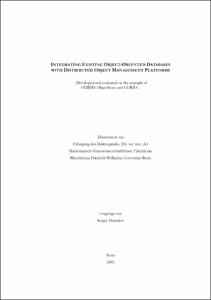Shumilov, Sergey: Integrating Existing Object-Oriented Databases with Distributed Object Management Platforms : Developed and evaluated on the example of ODBMS ObjectStore and CORBA. - Bonn, 2003. - Dissertation, Rheinische Friedrich-Wilhelms-Universität Bonn.
Online-Ausgabe in bonndoc: https://nbn-resolving.org/urn:nbn:de:hbz:5n-02660
Online-Ausgabe in bonndoc: https://nbn-resolving.org/urn:nbn:de:hbz:5n-02660
@phdthesis{handle:20.500.11811/1933,
urn: https://nbn-resolving.org/urn:nbn:de:hbz:5n-02660,
author = {{Sergey Shumilov}},
title = {Integrating Existing Object-Oriented Databases with Distributed Object Management Platforms : Developed and evaluated on the example of ODBMS ObjectStore and CORBA},
school = {Rheinische Friedrich-Wilhelms-Universität Bonn},
year = 2003,
note = {A common characteristic of today's information systems is the distribution of data among a number of autonomous systems and heterogeneous repositories. The key to their unification is the ability to access these multiple databases transparently, irrespective of their kind and location. However, direct database-level interoperation is not always possible because of the extreme heterogeneity of already existing applications, software environments and hardware platforms. A necessary infrastructure to deal with the heterogeneity and remote access in the object-oriented context can be provided by modern distributed object management platforms, such as a Common Object Request Broker Architecture (CORBA).
The thesis puts forward the concept of a framework for providing object persistence in object-oriented programming languages by integrating the powerful database facilities with the heterogeneous CORBA environment - the eXtensible Database Adapter (XDA). Providing a highly customisable environment with pre-defined adaptable, ready to use components the framework simplifies the development of the middle-tier level mediating between a database and CORBA. The conceptual basis of the framework is a distributed persistent object model that on the one hand provides the property of transparent access to persistent objects for usual CORBA objects and, on the other hand allows a soft, non-intrusive integration for existing databases. Thus, the solution possesses various valuable advantages such as the facility of creating high performance CORBA/ODBMS systems coupled with maximal flexibility, as well as the ability to build new, smoothly integrated, legacy database applications within the CORBA environment.
The vitality of the proposed concept is demonstrated on two implementations of the XDA, which has allowed us to identify the crucial problems appearing in the integration process and to propose corresponding solutions. Implementing new approaches for efficient request dispatching and transaction management the XDA permits the development of efficient and scalable distributed systems dealing with large numbers of persistent objects. Additionally, two alternative approaches intended to simplify the development of CORBA-adapters are studied: dynamic mediators and automated code generation.
At the time of writing, a running prototype of the XDA developed as part of this thesis supports the ObjectStore database management system. This prototype has been successfully applied in several geological research projects concerning the development of large 3D kinematic models of selected regions within the Lower Rhine Basin. We expect that the enhanced facilities in handling large sets of complex persistent data provided by techniques presented will enable the creation more comprehensive and powerful distributed database management systems.},
url = {https://hdl.handle.net/20.500.11811/1933}
}
urn: https://nbn-resolving.org/urn:nbn:de:hbz:5n-02660,
author = {{Sergey Shumilov}},
title = {Integrating Existing Object-Oriented Databases with Distributed Object Management Platforms : Developed and evaluated on the example of ODBMS ObjectStore and CORBA},
school = {Rheinische Friedrich-Wilhelms-Universität Bonn},
year = 2003,
note = {A common characteristic of today's information systems is the distribution of data among a number of autonomous systems and heterogeneous repositories. The key to their unification is the ability to access these multiple databases transparently, irrespective of their kind and location. However, direct database-level interoperation is not always possible because of the extreme heterogeneity of already existing applications, software environments and hardware platforms. A necessary infrastructure to deal with the heterogeneity and remote access in the object-oriented context can be provided by modern distributed object management platforms, such as a Common Object Request Broker Architecture (CORBA).
The thesis puts forward the concept of a framework for providing object persistence in object-oriented programming languages by integrating the powerful database facilities with the heterogeneous CORBA environment - the eXtensible Database Adapter (XDA). Providing a highly customisable environment with pre-defined adaptable, ready to use components the framework simplifies the development of the middle-tier level mediating between a database and CORBA. The conceptual basis of the framework is a distributed persistent object model that on the one hand provides the property of transparent access to persistent objects for usual CORBA objects and, on the other hand allows a soft, non-intrusive integration for existing databases. Thus, the solution possesses various valuable advantages such as the facility of creating high performance CORBA/ODBMS systems coupled with maximal flexibility, as well as the ability to build new, smoothly integrated, legacy database applications within the CORBA environment.
The vitality of the proposed concept is demonstrated on two implementations of the XDA, which has allowed us to identify the crucial problems appearing in the integration process and to propose corresponding solutions. Implementing new approaches for efficient request dispatching and transaction management the XDA permits the development of efficient and scalable distributed systems dealing with large numbers of persistent objects. Additionally, two alternative approaches intended to simplify the development of CORBA-adapters are studied: dynamic mediators and automated code generation.
At the time of writing, a running prototype of the XDA developed as part of this thesis supports the ObjectStore database management system. This prototype has been successfully applied in several geological research projects concerning the development of large 3D kinematic models of selected regions within the Lower Rhine Basin. We expect that the enhanced facilities in handling large sets of complex persistent data provided by techniques presented will enable the creation more comprehensive and powerful distributed database management systems.},
url = {https://hdl.handle.net/20.500.11811/1933}
}






